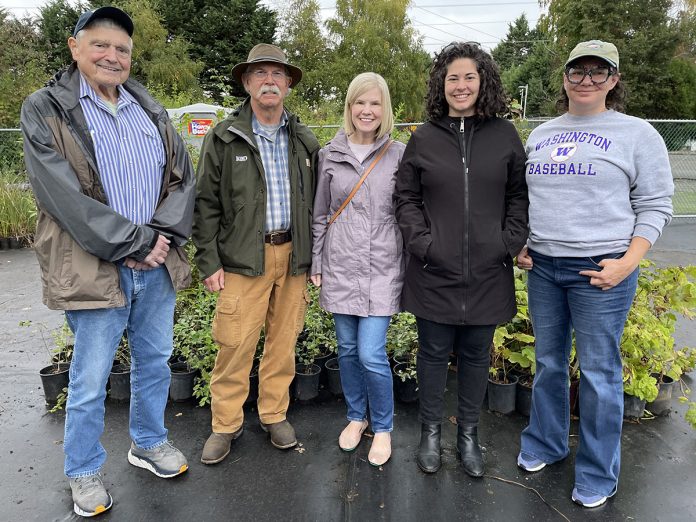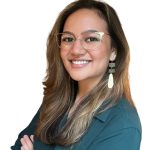
King Conservation District Supervisor Brittney Bush Bollay explains what their organization does and what’s at stake in this February election.
One of the most urbanist local elections is taking place right now and most voters have no idea.
It’s for the King Conservation District (KCD) Board of Supervisors Position #1, one of five people who manage a special purpose district with a 2024 budget of $12.5 million. The KCD is responsible for advancing climate justice and smart land use through support for the sustainable stewardship of natural resources. It works with municipalities and individuals on everything from forest management to wildfire preparedness to urban community gardens. Essentially, the KCD is a huge publicly-funded financial and educational resource to 2.2 million people in King County that isn’t tainted by the public distrust or bureaucratic red-tape that can plague government agencies. The KCD gets things done, and fast.
Did I know any of this until extremely recently? Absolutely not, and neither do most voters. In 2023, the last time a KCD Board of Supervisors election was held, the voter turnout rate barely cracked 1%. Yet the KCD’s work touches millions of people’s lives, affects the future of our water quality, forest health, and local food economies, and might be the only high-functioning, earnestly respectful, and dare I say wholesome body of elected officials left on planet earth.
And because the KCD helps people responsibly steward land use, build more just local economies, and mitigate suburban sprawl, there’s a clear nexus between the KCD election and the values of those of us who consider ourselves urbanists.
I sat down with Brittney Bush Bollay, the current vice chair of the KCD Board who is running for re-election to their second three-year term, to learn more about that.
This conversation has been edited for brevity and clarity with consent from the interviewee.
All eligible voters in the King Conservation District recently received a postcard in the mail telling us to vote in the KCD election. The postcard describes it as “A special purpose district, funded by taxpayers, with a mission to promote the sustainable use of natural resources through responsible stewardship in King County.” What’s missing from that description? What else do you mention in your elevator pitch about the KCD and why you’re running?
I ground my message and my work in the values of residents of King County. When I’m talking to people about what we do, I talk about what I’m excited about: we bring local food to local people, and we make it easier for everyone to access a local farmer’s economy. For example, we all love our farmers markets. KCD plays a huge role in resourcing and stabilizing our farmers markets, and helps our elders and families in need access Fresh Bucks to get fresh local produce and support our markets. And we all love our wild and agricultural spaces here in our county. KCD as a board advocates for good land use policy and plays a role in helping small farmers exist here.
We also have several different grant programs. Small farmers make up the largest portion of recipients. We help them handle large costs such as field drainage, and help take down barriers to agricultural conservation and equity in agriculture, like helping immigrant communities connect with culturally relevant crops. Or sometimes people come to us and say, “Hey, we need $10,000 for a commercial refrigerator to launch a Black Farmers program.” We can provide that. There’s an immediate impact I get to facilitate and see that’s so exciting for me.
When I talk about what we do, I talk about how this role is as much about good stewardship as it is about amplifying the message of what my constituents want. And at the end of the day, the biggest part of this job is supporting people’s dreams.
What drove you to run for this seat back in the spring of 2021?
I’ve always felt a really strong call to public service. There’s a phrase in Hebrew I was raised with – tikkun olam – that’s kind of like “to heal the world.” Essentially it’s about understanding that when it comes to healing the world and fighting against injustice, it’s not your responsibility to do all of the work but neither are you allowed to abstain from it. I always took that call very seriously and in my career so far I’d found that angle but it was never quite enough. Then I found out about the King Conservation District and the role of the board from my now-colleague Kirstin Haugen, and I realized: here’s a place where my skills and my desire to make a difference really match.
I’d had 5-6 years at the Sierra Club in different leadership positions, so I was familiar not only scientifically with environmental and climate change issues in our county but also I understood the political players – the push and pull, balances, needs, and special focuses. I had also been part of the Green New Deal table at city hall, so I had experience with hashing out people’s wants and needs in coalition. Basically I had a really strong basis in the environmental and political landscape and I had been building relationships so I knew who to reach out to for collaboration and questions. Ultimately, successfully running for this seat was about getting my message out there and having a backing of a community behind me.
What are you super proud of having accomplished in your first term? And what disappoints you in this role, like barriers that don’t need to exist, lack of resources for something important, or a thing you wanted to accomplish but couldn’t for XYZ reason?
When I came on, the KCD was in a really transitional place. There’d been a lot of turnover and turmoil in previous years, like some budgetary mishandling that had led to a lot of overspend. The county had lost a lot of trust in KCD as an organization, and we have an advisory committee we work closely with that includes a lot of electeds and activists; relationships were pretty tense. But within the first 6 months of my term, we hired a new permanent executive director and I’m really proud of that. Rosa’s amazing. She came from New York state from their Office of Environmental Justice, so when we hired her it was a very clear message that this was our viewpoint and the focus that we want to be aligned with. We’ve since taken this turmoil and built a really steady ground where our incredible staff feel values-aligned with each other, the Executive Director, the board, and everyone shares a clear vision. We’re now set to renew our agreement with the county this year, and I’m really proud and optimistic about that because we’ve built back our trust.
Something that’s been disappointing but that we’re still working on is election reform for this board. Last year, we had 1.04% voter turnout, and that was a record. But we have a $12.5 million budget in public money and we never appear on a paper ballot and most people don’t know this election exists. It’s not democratic. The public deserves a say in how that money is spent and who is spending it. And that’s not really happening. I believe in government transparency as an overarching principle and if that’s my legacy – if I just spend the next three years fighting to get this on a paper ballot to get this election to a place where more people can weigh in on what their money’s being spent on – that feels significant.
What’s at stake when people do or don’t vote in our KCD election?
I would like voters to know that everything we do impacts urban and rural residents both. When we do work that combats climate change, that benefits everyone. When we help small farmers, that benefits everyone. When we do soil testing – whether for an urban p-patch or a rural farmer – that benefits everyone. That’s what’s so exciting to me about conservation and environmental work in the first place — the fact that everyone is connected, everyone can help. I want everyone in the county to understand that everyone has something at stake here and has something they can do, especially because things can feel hopeless a lot. It’s hard to look at the headlines and feel optimistic, but serving on the KCD board demonstrates every single day that there are good people on the ground making the small changes that matter.
The conservation district came out of the Dust Bowl. It’s designed to prevent that from happening again. This environmental justice aspect is baked into our very existence at KCD. And it brings together a varied set of experiences among people who all share that goal. On the board, we’re all working towards the same broad set of values and we have a culture of honesty with each other, so we tend to be in agreement but we’re able to navigate any disagreement in a respectful way. Two of our board members are farmers. One board member works for the state Department of Natural Resources. Our chair worked on policy for King County under then-county-councilmember Bob Ferguson. Our five-person board has very varied backgrounds but we’re very tight. We’ve established a ton of trust with each other over the last five years and I’ve learned so much.
And why should urbanists care about it?
When I first got elected to KCD, I knew a lot about the scientific aspects of farming but I didn’t understand the economic pressures. For example, when farmers retire, fewer and fewer young people are interested in taking over family farms. And then farmers have people coming in from cities’ edges who want to build homes. It’s hard when land is moved out of agricultural use to get it back. Plus, the other thing that happens similar to urban gentrification is that the culture starts to change – people move in next door to a farm and complain about the noise of roosters.
What many people don’t know is that farmers also care for cities to become more dense and they support upzoning. Every report I’ve read says we need to fight back against development pressure in our agricultural lands. We need to make sure the Growth Management Act is strong and that cities and municipalities aren’t leaking around the edges. I am the person on the board right now who is the density advocate, the protect-farmland-from-suburban-sprawl advocate. There aren’t a lot of voices standing up for urbanism from a rural perspective, but we depend on each other. And I’m excited that we use the trust and collective expertise we have as an organization to advocate for good policy and fund important conservation work.

Hannah Sabio-Howell
Hannah Sabio-Howell is the chair of The Urbanist Elections Committee. She is also the communications director of Working Washington and Fair Work Center, a photographer, and an avid cyclist and public transit rider.
